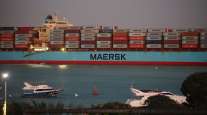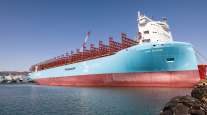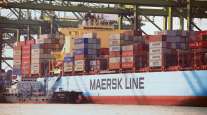Maersk Invests $1.4 Billion in Methanol-Powered Ships

[Stay on top of transportation news: Get TTNews in your inbox.]
The world’s largest container-shipping line is making a $1.4 billion investment in a greener fleet.
A.P. Moller-Maersk A/S has ordered eight new vessels, each costing $175 million, that can be propelled by cleanly made methanol instead of an oil-based fuel. They are set for delivery in 2024.
“We don’t believe in more fossil fuels,” said Morten Bo Christiansen, vice president and head of decarbonization. “A lot of our customers are very, very supportive of this.”
In 2024 we will introduce the first of 8 large dual fuel vessels that can run on #carbonneutral methanol. @hm @HP @SignifyCompany & @Unilever are onboard Read about their #sustainable commitments here: https://t.co/BMPX5Y7AFj #maersk #ClimateActionNow #greenfuel #SupplyChain pic.twitter.com/fgKEoF1gZJ — Maersk (@Maersk) August 24, 2021
Shipping, the backbone of global trade, accounts for almost 3% of man-made carbon dioxide emissions. The level has been rising in recent years, according to data from the International Maritime Organization. By 2050, the United Nations body wants shipping’s total greenhouse gas emissions to at least halve relative to 2008. Last year, IMO rules designed to curb air pollution by limiting the sulfur content of marine fuel came into force.
Maersk isn’t the only shipper starting to make the transition. Oil tanker owner Euronav NV has ordered new ships capable of one day running on ammonia or liquefied natural gas. Commodities trader Cargill Inc. has said it plans to add so-called wing sails to some of its fleet.
Back in February, Maersk said all future new-build vessels under its ownership would be able to use carbon neutral fuels. It also announced the launch in 2023 of a small container vessel that could run on clean versions of methanol. This latest order is much bigger — each ship can carry about 16,000 containers.
A.P. Moller - Maersk accelerates fleet #decarbonisation with 8 large ocean-going vessels to operate on #carbonneutral methanol - annual CO2 emissions savings of around 1 million tonnes.
Discover more here: https://t.co/BMPX5XPZgJ #Maersk #greenfuel #climateaction #alltheway pic.twitter.com/Nxsj3i8mRs — Maersk (@Maersk) August 24, 2021
“This is a firm signal to fuel producers that sizable market demand for the green fuels of the future is emerging at speed,” Maersk CEO Soren Skou said. More than half of the company’s 200 largest customers have set science-based or zero-carbon targets for their supply chains or are in the process of doing so, according to a statement.
The new vessels, built by Hyundai Heavy Industries Co., represent about 3% of Maersk’s total container capacity. They will replace older ships in the company’s fleet, saving about 1 million tons of carbon dioxide a year. Maersk has the option for four more of the ships to be delivered in 2025.
The company acknowledges that finding enough carbon-neutral methanol for the vessels from the first day of service will be challenging. The additional design cost of being able to run on both methanol and conventional oil-derived, low-sulfur marine fuel will be in the range of 10-15% of the vessels’ total price. Maersk plans to use carbon neutral e-methanol or sustainable biomethanol as soon as possible in the new ships.
Environmentally friendly sailing isn’t cheap. The clean methanol that the ships can burn is at least twice as expensive as the fossil-based, ultra-low-sulfur fuel oil used by many vessels today, according to Christiansen. In a normal freight rate environment, today’s bonanza prices being an exception, doubling the fuel price translates to about a 15% rate increase, he said.
Want more news? Listen to today's daily briefing below or go here for more info:




